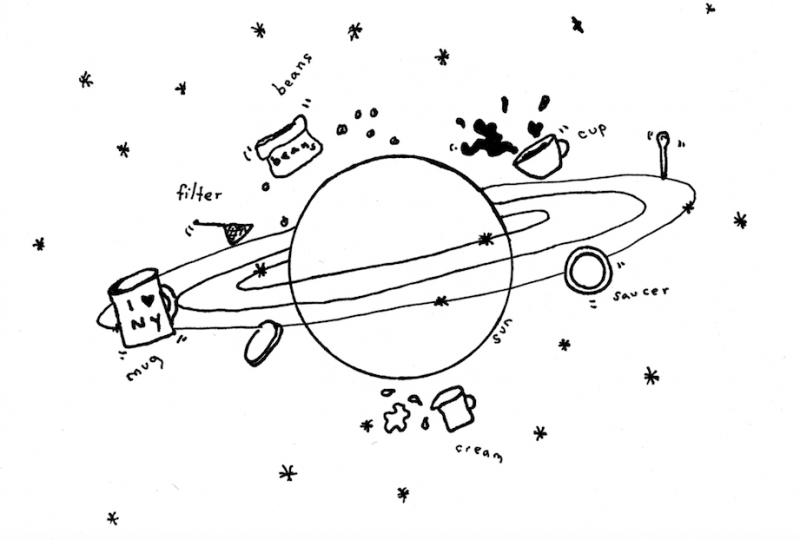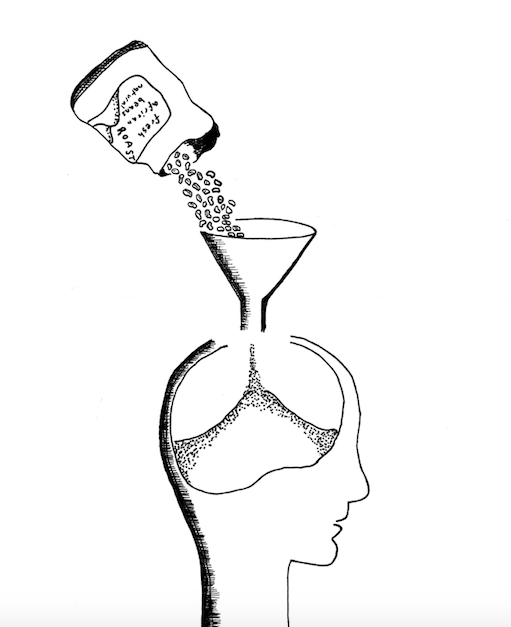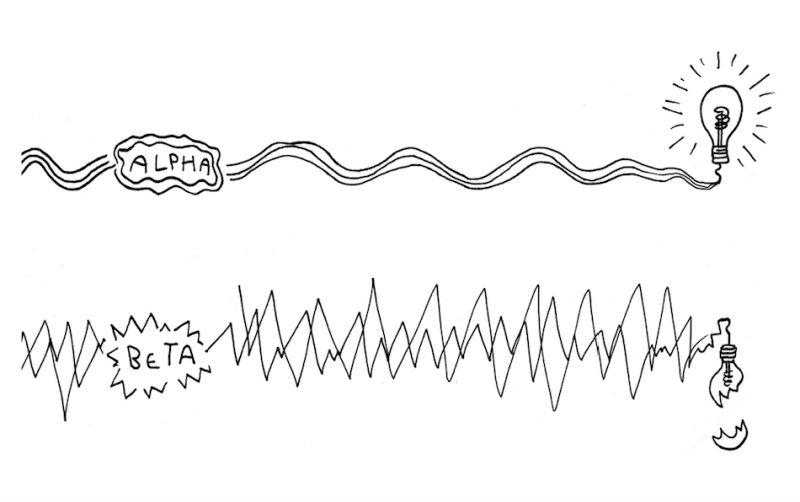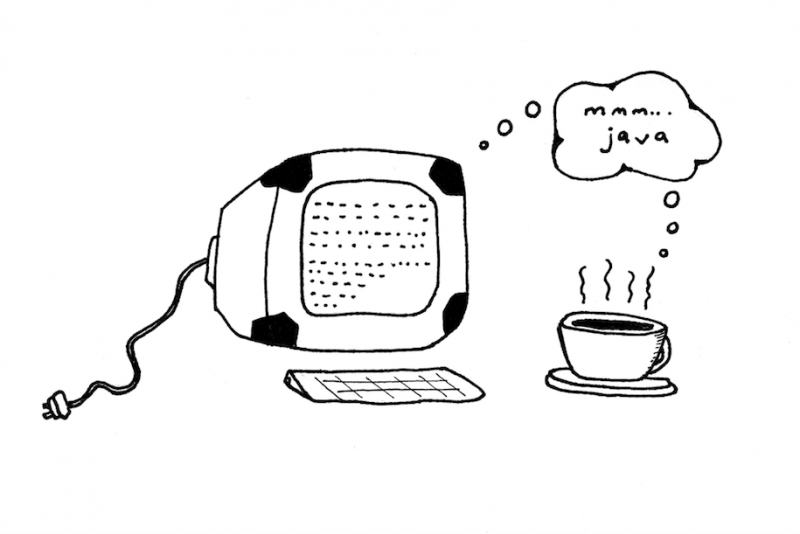The Alchemy of Coffee: Where good ideas come from.
The idea was simple. Get an authority on creativity to write about the role coffee plays in the creative process and those tortured souls who rely on creative ideas for their living. From Mexico City to Johannesburg. From Prague to London. From creative directors to writers, filmmakers, poets and lovers. Coffee drives the chemistry that ignites the creative mind. Armed with a pot of Colombian drip coffee and a pack of cigarettes, Gordon Torr, one of the greatest minds in creativity is about to take your brain for a spin through the cosmic chasm that is the caffeine fuelled creative brain. (WARNING: You will need to read this twice – and you will need google close at hand - unless you have a PHD in literature and astrology – Enjoy! Iain and Mel.)
Words by Gordon Torr
All illustrations by Lickable Squid

Tea is the meeting; coffee is the idea.
Put it this way: unless you think the British Empire was a work of undiluted genius, no one ever had a good idea drinking tea.
Anecdote will tell you the same thing. London’s first coffee bar, the 2i’s opened in Old Compton Street in Soho in 1956. Before it was closed down by health and safety fascists in 1970, the 2i's had become the epicentre of the skiffle movement that gave the world Lonnie Donegan who inspired John Lennon to buy his first guitar.
The assistant manager was one Jon Vickers-Jones who described it years later as a “…dismal and dark cellar about the size of a large bedroom, lit by a couple of weak bulbs. At one end was the small 18-inch stage made of milk crates with planks on top of them. There was just one microphone, left over from the Boer War, and some speakers up on the wall."
Whether British rock ‘n roll was inspired by the UK’s first espressos or whether the 2i’s attracted those early skifflers because it was the only place in London that kept its lights on after midnight, anecdote doesn’t say. Anecdote will tell you anything if it sounds like a good story.
So how much creativity is in a mugful? Or does coffee just happen to be there, like an innocent bystander at the scene of an accident, every time I think I’ve thought of something worth thinking about?
I sat down with a medium-dark roast Colombian to find out.
While it's self-evidently true that we wouldn't have let them Starbuck the world's high streets if we hadn't wanted a convenient nearby table and two chairs to meet people we'd never invite into our homes, no one goes to a coffee shop without secretly hoping the other party doesn't show up. Because tea is social, but coffee feels deeply, profoundly and intrinsically personal.
We'll do the intrinsic part first. The average caffeine level in a cup of black English-style tea is 40mg. In an average cup of "drip" coffee you'll get around 105mg. That's the difference between talking about how the kids are getting on at ballet or rugby and talking about the effect of moonbeams on the lips of your lover.

The science of caffeine is exciting because we know dangerously little about it. The only reputable study of the effect of caffeine on our states of mind was done in 1993 by the dream team of Dimpfel W, Schober F, and Spüler M if you want to look it up. They were interested, specifically, in the effect of different dosages of the drug on the gross rhythms of human mental activity, the alpha and beta states that have found their way into dinner table conversations the way the motions of the planets around the sun have found their way into our most intimate discussions about romance, destiny and the meaning of life.
But first a caveat: it wasn’t that Dimpfel et al had a theory they were trying to prove or disprove. The frequency of gross brain activity is the only mental function neurologists can measure with any degree of accuracy, and we know now, of course, that what can’t be measured doesn’t exist.
They found what you’d expect them to find: “Administration of 200mg and 400mg caffeine in the relaxed state effected the decrease in spectral power in the theta and alpha ranges” or, less formally, (because theta is very sleepy and alpha just kind of sleepy) caffeine is a rush and a lot of it is a bigger rush.
The really interesting bit is hidden in a paradoxical footnote they seem reluctant to unpick. When the warm flood of that first cup begins to subside like an ocean wave sinking back into the arms of its Indian mother, the declining concentration of caffeine has the contradictory effect of enhancing “…theta power in frontal and occipital regions and the alpha power in [the] occipital cortex.” My italics.
Let’s back up for the sake of those who don’t know what Neptune can do in a trine.
Our slowest mental state is a deep, dreamless sleep called delta, which ticks over at a lazy 0.5-4Hz. Any slower and you’d be dead.
Theta (4-7.5Hz) is the twilight of dreams.
Alpha is the sweet spot of the imagination, the over-hyped state sought after through the annals of human history by poets, art directors and hedge fund managers, which ranges between a delirious 7.5 and an ineffably cool 12 cycles per second. It’s the edge of falling asleep; the blissful letting go of the preoccupations of the day as you plunge into the loving embrace of theta; that intimation of the numinous as you look out of the office window and notice without actually noticing that the tops of the lamp-posts look like a silver ducks swimming in a jacaranda sea towards a sunrise painted in lilacs that haven’t been invented yet as if they always have been swimming and always will be just before a voice that may or may not be real says, “You can’t smoke that stuff in here.”

Alpha is where ideas happen if you're sober enough to stand up and tap them on the shoulder to stop them before they walk out the door.
For people who are happy to live in the real world there’s always beta. It’s the actual voice saying the actual words. It’s the sharp knock of the door of your attention, the insistent phone ringing in the corner of your alpha state telling you to wake the fuck up. Beta remembers the name of the trainee brand manager’s Chihuahua. It’s twelve men in a meeting room full of women. Beta has its ducks in a row; beta knows which way’s next. It thrills to the text alert, it jives on java, it decodes codes and ups its games and plays its cards and games its scores. Beta is busy; beta is good; beta writes the emails that cc the boss that pleases the clients that pay the rent.
But anything above the 30Hz upper limit of beta and you’re flirting with gamma, and no one has ever come back from gamma without frost in their ears and tiny bolts of lightning jumping from knuckle to knuckle.
Coleridge was in alpha when he wrote the first verse of Kubla Khan. Then the person from Porlock knocked on his door and the rest of it got written in an airless beta in which you can hear creaking like the old timber of a boat that’s been in dry dock too long and no one remembers the owner of or cares to.
If it were just about caffeine, five cups of tea would add up to two cups of coffee, and we could call it mere chemistry and move on. But everything is mere chemistry until it becomes alchemy.
Don’t be deceived by Dimpfel et al’s downbeat delivery. That alpha kick in the occipital cortex is an anomaly no amount of caffeine can explain away; and scientists don’t speculate.
The OC is the visual processing centre of the mammalian brain. Why would it light up like a thousand incense sticks glowing in an empty cathedral while the rest of the brain was stuck in traffic adjusting its tie and touching up its lipstick in the rear-view mirror and thinking about merchandising opportunities?

Only the coffee could have done that—yes, perhaps on caffeine-powered wings; but only the flavour of a forgotten geography could have brought you to the place you find yourself now, here on the hillside of this green plantation, the cortex pricked by the taste of its memory; here where Africa met America to make the rhythm of the curruloa that drifts in this mist of low clouds above Cartagena scented with the secret distillates of the ochre and umber earth that squeezes between the toes of your surprisingly bare feet; here, too, and somehow simultaneously in the Elephant Room staring through glass at taxis in the rain as beta nudges your arm to say, Hey, isn’t that J.K. Rowling dreaming of schools for wizards and in the Café La Biela where Borges is waving away the waiting waiter, and so on through the pantheon of the minor and major saints of the imagination, none of whom have come to meet anyone they wouldn’t rather conjure out of the fine, sweet grinds at the bottom their third or fourth cup.
The best coffee in the world can’t guarantee a good idea, but even the worst cup tastes like the promise of one. Who would dare to interrupt that?